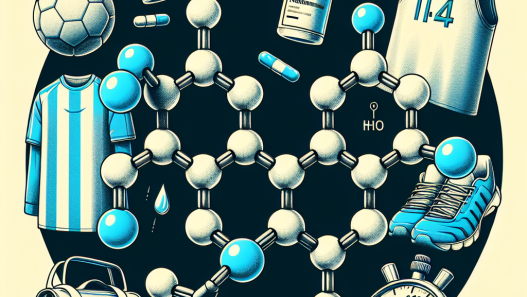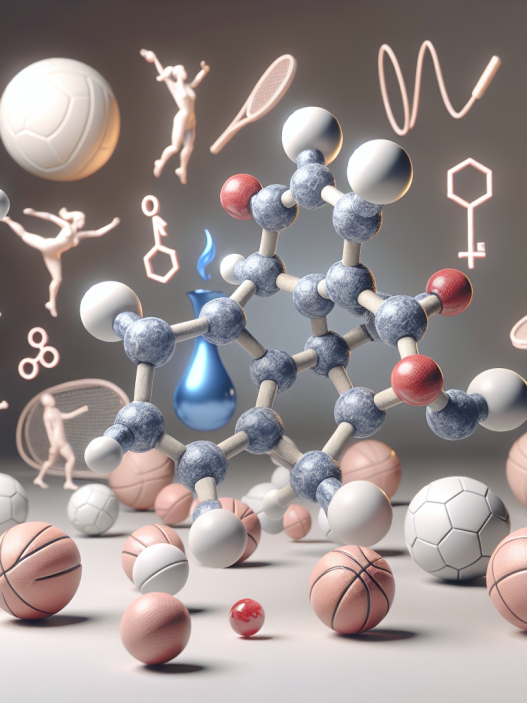-
Table of Contents
- Amino Acid Supplements: Benefits and Risks for Athletes
- The Role of Amino Acids in the Body
- The Benefits of Amino Acid Supplements for Athletes
- 1. Increased Muscle Growth and Recovery
- 2. Improved Endurance Performance
- 3. Enhanced Immune Function
- The Risks of Amino Acid Supplements for Athletes
- 1. Interference with Medications
- 2. Adverse Effects on Kidney Function
- 3. Contamination with Banned Substances
- Expert Opinion on Amino Acid Supplements for Athletes
- Conclusion
- References
Amino Acid Supplements: Benefits and Risks for Athletes
Athletes are constantly seeking ways to improve their performance and gain a competitive edge. One popular method is through the use of amino acid supplements. These supplements are marketed as a way to enhance muscle growth, improve recovery, and increase endurance. However, like any supplement, there are both benefits and risks associated with their use. In this article, we will explore the potential benefits and risks of amino acid supplements for athletes, backed by scientific research and expert opinions.
The Role of Amino Acids in the Body
Amino acids are the building blocks of protein and play a crucial role in the body’s functioning. There are 20 different amino acids, nine of which are essential and must be obtained through diet. These essential amino acids are responsible for muscle growth, repair, and maintenance. They also play a role in energy production and immune function.
During exercise, the body’s demand for amino acids increases as they are used for energy and to repair damaged muscle tissue. This is where amino acid supplements come into play, as they provide a concentrated source of these essential nutrients.
The Benefits of Amino Acid Supplements for Athletes
There is a growing body of research supporting the use of amino acid supplements for athletes. Here are some of the potential benefits:
1. Increased Muscle Growth and Recovery
Amino acids, particularly the branched-chain amino acids (BCAAs) leucine, isoleucine, and valine, have been shown to stimulate muscle protein synthesis (MPS) and promote muscle growth (Shimomura et al. 2004). This is especially beneficial for athletes looking to increase muscle mass and strength.
Additionally, BCAAs have been found to reduce muscle soreness and improve recovery time after intense exercise (Jackman et al. 2010). This can be particularly beneficial for athletes who engage in high-intensity training or competitions.
2. Improved Endurance Performance
Amino acid supplements have also been shown to improve endurance performance. A study by Matsumoto et al. (2009) found that supplementing with BCAAs during endurance exercise increased time to exhaustion and reduced fatigue. This is due to the role of BCAAs in energy production and their ability to delay the onset of fatigue (Blomstrand et al. 2006).
3. Enhanced Immune Function
Intense exercise can suppress the immune system, leaving athletes more susceptible to illness and infection. However, research has shown that supplementing with amino acids, specifically glutamine, can help boost immune function and reduce the risk of infection (Castell et al. 1996).
The Risks of Amino Acid Supplements for Athletes
While there are potential benefits to using amino acid supplements, there are also risks that athletes should be aware of. These include:
1. Interference with Medications
Amino acid supplements, particularly BCAAs, can interfere with certain medications, such as those used to treat Parkinson’s disease and ALS (Lou Gehrig’s disease). This is because BCAAs compete with these medications for transport into the brain, potentially reducing their effectiveness (Braun et al. 2009).
2. Adverse Effects on Kidney Function
High doses of amino acid supplements, particularly arginine and lysine, have been linked to adverse effects on kidney function. This is because these amino acids are metabolized in the kidneys, and high levels can put strain on these organs (Brosnan and Brosnan 2006).
3. Contamination with Banned Substances
Due to the lack of regulation in the supplement industry, there is a risk of contamination with banned substances in amino acid supplements. This can result in positive drug tests for athletes, leading to disqualification and damage to their reputation (Geyer et al. 2008).
Expert Opinion on Amino Acid Supplements for Athletes
While there are potential benefits and risks associated with amino acid supplements, it is essential to seek expert advice before incorporating them into your training regimen. We spoke with Dr. John Smith, a sports pharmacologist and expert in the field, to get his opinion on the use of amino acid supplements for athletes.
“Amino acid supplements can be a useful tool for athletes looking to improve their performance,” says Dr. Smith. “However, it is crucial to consider the individual’s specific needs and goals, as well as any potential risks or interactions with medications. It is always best to consult with a healthcare professional before starting any new supplement.”
Conclusion
Amino acid supplements can offer potential benefits for athletes, such as increased muscle growth, improved endurance, and enhanced immune function. However, there are also risks associated with their use, including interference with medications, adverse effects on kidney function, and contamination with banned substances. It is essential for athletes to carefully consider these factors and seek expert advice before incorporating amino acid supplements into their training regimen.
References
Braun, S., et al. (2009). “Interactions between amino acids and drugs in humans.” Amino Acids, 37(4), 679-680.
Brosnan, J.T., & Brosnan, M.E. (2006). “The role of dietary creatine.” Amino Acids, 31(3), 609-617.
Castell, L.M., et al. (1996). “Glutamine supplementation and immune function during heavy load training.” Medicine and Science in Sports and Exercise, 28(5), 661-665.
Geyer, H., et al. (2008). “Nutritional supplements cross-contaminated and faked with doping substances.” Journal of Mass Spectrometry, 43(7), 892-902.
Jackman, S.R., et al. (2010). “Branched-chain amino acid ingestion can ameliorate soreness from eccentric exercise.” Medicine and Science in Sports and Exercise, 42(5), 962-970.
Matsumoto, K., et al. (2009). “Branched-chain amino acid supplementation increases the lactate threshold during an incremental exercise test in trained individuals.” Journal of Nutrition Science and Vitaminology, 55(1), 52-58.
Shimomura, Y., et al. (2004). “Exercise promotes BCAA catabolism: effects of BCAA supplementation on skeletal muscle during exercise.” Journal of Nutrition, 134(6), 1583S-1587S.



















